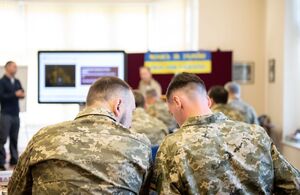
In response to a request from the Armed Forces of Ukraine, on 5 June the UK Ministry of Defence announced that a group of ten Ukrainian chaplains have been integrated with the Royal Army Chaplains’ Department of the British Army for the past two weeks, completing training with British forces.
The chaplains paired with their British counterparts to receive insights that will equip then in the provision of pastoral care, spiritual support and moral guidance during military operations, as well as the subsequent post-war reconstruction phase.
Participants offered support to troops who are presently undergoing battlefield training in Wiltshire as part of the UK-led training of Ukrainian recruits.
Over 15,000 Armed Forces of Ukraine personnel have been trained by the UK and its allies in various areas, including frontline combat fundamentals and specialised training. Basic recruits undergo a rigorous five-week training programme that equips them with essential skills to defend their country upon their return to Ukraine. The training covers a range of topics including weapons handling, battlefield first aid, fieldcraft, patrol tactics, and the Law of Armed Conflict.
This chaplaincy course, the first of its kind taught in the UK, was developed by British military chaplains and supported by the UK Armed Forces under Operation Orbital. It aimed to provide the ten chaplains with planning tools, religious and pastoral resources, and hands-on experience to enhance their effectiveness on the front line.
The Ukrainian military’s Chaplaincy branch, officially established in 2021, has seen a steady increase in its number of members. Presently, the branch consists of 160 chaplains who represent a diverse range of faiths. The organisation has set a goal to increase their number of chaplains to 738 in order to provide spiritual and pastoral assistance to all units, hospitals, and training sites.
Reverend Michael D Parker KHC CF, Chaplain General of the British Army, said that chaplaincy is deemed “critical capability for Ukrainian commanders.”
“Chaplains are in demand and it is truly humbling to be asked to support them in deepening their understanding of their role within war,” continued Rev. Parker. “These ten chaplains have answered the call of their nation; they are no longer just our international partners, they are our colleagues and friends. I pray that God will bless, protect and guide them as they return to Ukraine.”
The programme was dedicated to providing chaplaincy services in an operational setting, delivering necessary religious and practical resources to support personnel through the most challenging aspects of operations, including bereavement and loss, as well as mental health difficulties.
Since its establishment in 1796, the Army Chaplains’ Department has been renowned for its role in providing solace, support, and empathy to individuals affected by conflict. For over 75 years, Chaplains have been an integrated part of the British military, providing support and care to soldiers and their families regardless of their beliefs, values, or social standing. They have been deployed to every location where British troops have been sent since 1945.
“These ministers are driven by their faith to step out of the door, unarmed, into the face of any enemy so that they can provide care for people of all beliefs,” said Reverend Robin Richardson, Chaplain of Royal Army Chaplain’s Department, who was responsible for developing the programme. “They are operating in circumstances that we could never dream of experiencing ourselves, drawing on their faith to support those navigating the chaos of war and doing everything they can to give soldiers hope.
The UK’s bespoke programme showcases the extensive range of training that has been provided to the Armed Forces of Ukraine. This training has encompassed skills including basic infantry training, medical training, and instruction on the operation of Challenger 2 tanks.
In 2022, the UK Government extended military aid to Ukraine to approximately £2.3bn, and the Prime Minister has pledged to continue this support in 2023, by matching that amount. The aid package already includes over 10,000 anti-tank missiles, 100,000 rounds of artillery ammunition, and crucial air defence capabilities, such as more than a hundred anti-aircraft guns and self-propelled artillery. Plans are underway to provide an additional 100,000 rounds of artillery ammunition in 2023.







